Friday Feb 20, 2026
Friday Feb 20, 2026
Tuesday, 12 November 2024 02:37 - - {{hitsCtrl.values.hits}}

President Anura Kumara Dissanayake
President Anura Kumara Dissanayake, speaking at the National People’s Party (NPP) final rally in Piliyandala last evening, described the upcoming 14 November Parliamentary Election as crucial to solidifying the recent political shift in Sri Lanka.
Dissanayake called it “an election that must be won,” highlighting that the 21 September Presidential election marked a historic transfer of power from the “corrupt elite” to the people.
According to Dissanayake, this unexpected change has unsettled the ruling classes, who had anticipated that power would remain within a few influential families.
“It has mentally stressed them,” he observed, attributing recent statements made on the campaign trail by Opposition figures to their discomfort with the new Government. He argued that these individuals are “finding this unbearable” and are actively hoping for the Government’s failure, sentiments he believes stem from their disappointment at losing power.
“The country, once divided along various lines, has now come together with hope and expectations for the NPP. The Government will remain strong due to the trust placed by the people,” he assured.
Dissanayake said the change has been long-awaited by the people and is reflected in the support seen across the country.
“The people here are evidence that this victory cannot be overturned,” he asserted, adding that the NPP has also gained significant support in the North, where there is “great hope” for the party in the upcoming election.
He stated: “For the first time, a political force which has won the trust of all people has been built,” and predicted NPP gains in the North and East. He called every vote from these regions a “powerful one.”
The President praised the NPP’s unique role in uniting the traditionally divided regions of Sri Lanka, saying: “Our traditional politics were divisive, i.e. against the North and South. For the first time, a politics of unity has arisen which has brought the North, South, East, and West under one flag.” This, he stated, has brought together a country divided along various lines, fostering new hope and expectations focused on the NPP.
Dissanayake pointed out that the current structure—a President and Cabinet of three—is insufficient to address the challenges the Government faces.
“Political power has been divided among various entities and centred around them,” he explained, criticising the indefinite postponement of local Government elections. He argued that to effect a full transformation across all sectors, it is essential to have close political leadership and a powerful majority in Parliament to provide “transformative guidance.”
He called on the public to support the NPP in the 14 November election, describing it as a vital step towards realising this transformation.
“On 14 November, we must fill the Parliament with NPPers,” he urged, to ensure that the NPP can obtain the necessary Parliamentary power.
Addressing concerns about the NPP’s inexperience in governance, Dissanayake rejected the notion that his party lacks capable leaders.
He acknowledged that while some of the NPP’s candidates may be new to Parliament, they are not new to politics. “They are those who stood for the people and fought for their rights and betterment,” he said. In a call for broader change, he also appealed to those voting for other parties to support new candidates, stating: “Send new faces from their parties, and we will teach them good ways.”
Emphasising the need for a completely renewed legislature, he remarked: “Especially this Parliament must be new. It must be cleaned.”
He likened the 14 November vote to a “national level shramadana”—a communal effort to restore and rejuvenate the country’s political landscape and to create a clean, accountable Government.